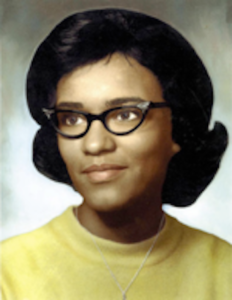
Carol M. Jenkins
*On this date in 1968, Carol M. Jenkins was murdered. She was a Black woman killed by a white man before hate crimes due to race were a common term.
While she was selling encyclopedias door to door, Jenkins was murdered in Martinsville, Indiana. Thirty-four years later, on May 12, 2002, authorities arrested Kenneth C. Richmond, a 70-year-old white man, for the crime. Shirley Richmond McQueen's secret led detectives to the long-awaited arrest of a suspect in this city's most notorious killing. But the Indiana State Police had a secret of their own, and it was vital in persuading them that they finally had found the man who stabbed Carol Marie Jenkins.
While selling encyclopedias door-to-door on a rainy night, the 21-year-old was impeccably dressed. Accounts of the crime routinely mentioned the white cotton turtleneck, olive green wool slacks, and brown jacket with a mandarin collar that buttoned in front. But the yellow scarf found around Jenkins' neck was never divulged by the federal, state, and local authorities who investigated her death over three decades.
"She was always a neat dresser," said Jenkins' stepfather, Paul Davis. "And she wore a lot of scarves." The arrest of Richmond, a 70-year-old resident of an Indianapolis nursing home, brought consolation to Davis and other relatives seeking justice for the cruelty of Jenkins' slaying. Martinsville leaders also hoped for vindication in Richmond's arrest, saying it finally might end the charges of racism and foot-dragging in the local police investigation of the killing. However, the Indiana State Police showed that even the coldest cases might lead to an arrest. "Let's not lose sight that this young lady was murdered 33 years ago, and her family has experienced a lot of pain in not knowing what happened to her," Indiana State Police Superintendent Melvin Carraway said.
In 2002, Davis doubted that his stepdaughter's killer would find justice. In frustration, he hired a former State Police detective working as a private detective. At about the same time, Carraway assigned the Jenkins case to veteran detectives Maurice "Bud" Allcron and Alan McElroy, who were part of a cold-case unit formed to renew investigations that had lost momentum. "I read the summaries of these murders that can be lost in the files," Carraway said, "and I think what the families must be going through.
"Sometimes I get calls from those families, asking for help. So, we must commit the resources or publicity to find the answers." About a year after the renewed investigation, one answer came in an anonymous letter urging investigators toward Richmond, a career criminal with a history of bizarre behavior and affiliation with groups such as the Ku Klux Klan. It eventually led to Shirley McQueen, a 40-year-old woman who finally confirmed what the letter alleged -- that as a 7-year-old, she had watched from the back seat of a car as her father and another, still-unidentified man killed Jenkins. Detectives found one woman who had called Davis only to determine that her information was secondhand. She offered vital details of what she saw -- including the scarf.
That made the crucial difference between McQueen's story and all the others that Jenkins' family and the police investigating her death had heard. Her surviving relatives sometimes received anonymous claims of "witnesses" to the killing or knowledge of the killers' identity. Another tipster told the family that the murder weapon had been dropped into a buried gasoline tank near where Jenkins' body was on East Morgan Street. The fuel tank was excavated, and authorities found a chisel inside. Police immediately said it was not the murder weapon.
Allcron and McElroy interviewed about 150 people, painstakingly eliminating various suspects identified in calls to Davis and other relatives. By 2001, speculation began to center again on a former suspect living in Florida. Upon learning that, a woman named Connie McQueen sent the letter implicating Richmond. In December 2001, detectives finally tracked down the anonymous writer. She said her former sister-in-law, Shirley McQueen, had told family members that she saw her father kill an African American woman -- an account that Shirley McQueen eventually confirmed.
According to police reports, she remembered that "the lady was carrying an item that resembled a suitcase or box. She was wearing a scarf around her neck and had framed glasses." Shirley McQueen told investigators that when she and her father got home that night in September 1968, he gave her $7 not to say anything about what had happened. His warning: "It was our secret." Kenneth Clay Richmond died on August 31, 2002, of cancer, clinging to his denial of the charge that he killed a young woman selling encyclopedias in Martinsville nearly 34 years ago.